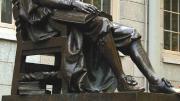Tourists adore John Harvard, the statue, for their Yard photo ops. Development officers revere the man for his cash-giving precedent. Now, Richard Dey ’73, who was poetry editor for The Harvard Advocate, has performed the seemingly impossible act of putting the iconic image and the other aspect of Harvard’s founding philanthropy (his library) in a new light. Rather than looking up at the figure, he recalls, he observed at eye level, focusing on the books at the great man’s feet. The resulting poem is his contribution to his class’s fiftieth anniversary report:
The books beneath John Harvard’s chair
are two and weigh too much
to add to the one already sitting not quite
square
on his lap, as he looks away,
lost in thought—or, perhaps, in prayer
for guidance in the case of
an older clergyman’s daughter?What are they doing there,
beside the right rear leg,
in the shadow of that pacific stare?
Volumes from different, likely opposing
sets,the top one’s bigger than the bottom,
but neither, to judge by their hard covers,
looks exactly lite.Are they texts, no longer relevant?
Classics that served John’s awakening?
Are they closed for good, for opening
only in our dreams?Or could they be, these books, blank,
made for each of us to fill
up as we travel, tasting
the salt spray?
Ask Admiral Morison.However we read them or write
our trials on their pages,
the books beneath John Harvard’s chair
hold his long pacific stare.
Edwin Augustus cranston, professor of Japanese history emeritus, memorialized by the Faculty of Arts and Sciences (FAS) in February, had a long life (from 1932 to 2021) and Harvard career, beginning as an instructor in Japanese in 1965, proceeding from assistant and associate to full professor in 1972: the early steps in 56 years of faculty service.
His longevity seems of a piece with the scale of his scholarship as interpreter and translator of ancient and classical poetry. Per the memorial, his favorite subject was “the 31-syllable short poem, the waka (or tanka), as seen in his magnum opus: two massive publications of a projected four volumes of translations intended to cover the entire history of classical Japanese poetry up to the year 1502.” The first installment, begun in the mid-1970s and published in 1993, “includes nearly 1,600 poems up to the end of the eighth century.” The second (2006), incorporated more than 2,700 poems, “including all 795 waka woven into” The Tale of Genji. His translations satisfied his dual criteria: to render texts “accurately, and…with stylistic appropriateness”—informed by his own poetry.
Propelled by “literary tastes [that] were discerning but diverse,” Cranston was also a notable fan of Robinson Jeffers, and “his interest in the verse…of Alexander Pushkin led him to poetic experiments that he termed studies in Pushkinotics.” Along the way, he chaired the department of East Asian languages and civilizations, but even its scope seems far too limited for the man and his enthusiasms.
Another long, consequential Harvard arc ended with the death last November of John Bayley Fox Jr. ’59, who had a lasting effect on the College, Graduate School of Arts and Sciences (GSAS), and FAS.
Fox began work on campus in 1967, in career services (fraught duty during the era of Vietnam War draft resistance). As College dean (1976-1985), he reorganized the House system into its present form, with first-year men and women living in the Yard, and the former Radcliffe Quad dorms becoming Houses. As GSAS’s administrative dean, he created its student center in Lehman Hall. As secretary of the faculty from 1992 to 2004, he complemented perfectly Jeremy R. Knowles, the FAS dean for most of that time.
Elegant and wry, Fox was the sort of effective administrator who helped move Harvard forward for decades, enjoying what he knew he accomplished (and enjoying keeping quiet about it). Memorably tall, his shadow lingers over the place in good ways.









